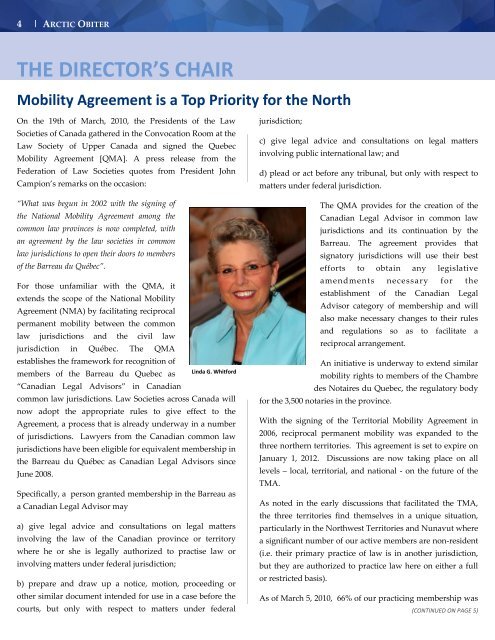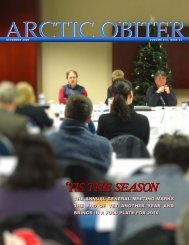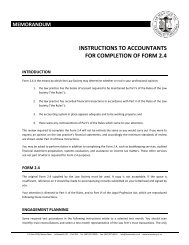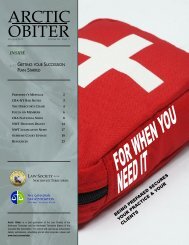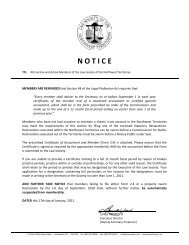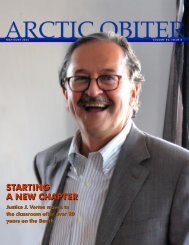ARCTIC OBITER
Arctic Obiter - March 2010 - Law Society of the Northwest Territories
Arctic Obiter - March 2010 - Law Society of the Northwest Territories
You also want an ePaper? Increase the reach of your titles
YUMPU automatically turns print PDFs into web optimized ePapers that Google loves.
4 | <strong>ARCTIC</strong> <strong>OBITER</strong><br />
THE DIRECTOR’S CHAIR<br />
Mobility Agreement is a Top Priority for the North<br />
On the 19th of March, 2010, the Presidents of the Law<br />
Societies of Canada gathered in the Convocation Room at the<br />
Law Society of Upper Canada and signed the Quebec<br />
Mobility Agreement [QMA]. A press release from the<br />
Federation of Law Societies quotes from President John<br />
Campion’s remarks on the occasion:<br />
“What was begun in 2002 with the signing of<br />
the National Mobility Agreement among the<br />
common law provinces is now completed, with<br />
an agreement by the law societies in common<br />
law jurisdictions to open their doors to members<br />
of the Barreau du Québec”.<br />
For those unfamiliar with the QMA, it<br />
extends the scope of the National Mobility<br />
Agreement (NMA) by facilitating reciprocal<br />
permanent mobility between the common<br />
law jurisdictions and the civil law<br />
jurisdiction in Québec. The QMA<br />
establishes the framework for recognition of<br />
members of the Barreau du Quebec as<br />
“Canadian Legal Advisors” in Canadian<br />
Linda G. Whitford<br />
common law jurisdictions. Law Societies across Canada will<br />
now adopt the appropriate rules to give effect to the<br />
Agreement, a process that is already underway in a number<br />
of jurisdictions. Lawyers from the Canadian common law<br />
jurisdictions have been eligible for equivalent membership in<br />
the Barreau du Québec as Canadian Legal Advisors since<br />
June 2008.<br />
Specifically, a person granted membership in the Barreau as<br />
a Canadian Legal Advisor may<br />
a) give legal advice and consultations on legal matters<br />
involving the law of the Canadian province or territory<br />
where he or she is legally authorized to practise law or<br />
involving matters under federal jurisdiction;<br />
b) prepare and draw up a notice, motion, proceeding or<br />
other similar document intended for use in a case before the<br />
courts, but only with respect to matters under federal<br />
jurisdiction;<br />
c) give legal advice and consultations on legal matters<br />
involving public international law; and<br />
d) plead or act before any tribunal, but only with respect to<br />
matters under federal jurisdiction.<br />
The QMA provides for the creation of the<br />
Canadian Legal Advisor in common law<br />
jurisdictions and its continuation by the<br />
Barreau. The agreement provides that<br />
signatory jurisdictions will use their best<br />
efforts to obtain any legislative<br />
amendments necessary for the<br />
establishment of the Canadian Legal<br />
Advisor category of membership and will<br />
also make necessary changes to their rules<br />
and regulations so as to facilitate a<br />
reciprocal arrangement.<br />
An initiative is underway to extend similar<br />
mobility rights to members of the Chambre<br />
des Notaires du Quebec, the regulatory body<br />
for the 3,500 notaries in the province.<br />
With the signing of the Territorial Mobility Agreement in<br />
2006, reciprocal permanent mobility was expanded to the<br />
three northern territories. This agreement is set to expire on<br />
January 1, 2012. Discussions are now taking place on all<br />
levels – local, territorial, and national - on the future of the<br />
TMA.<br />
As noted in the early discussions that facilitated the TMA,<br />
the three territories find themselves in a unique situation,<br />
particularly in the Northwest Territories and Nunavut where<br />
a significant number of our active members are non-resident<br />
(i.e. their primary practice of law is in another jurisdiction,<br />
but they are authorized to practice law here on either a full<br />
or restricted basis).<br />
As of March 5, 2010, 66% of our practicing membership was<br />
(CONTINUED ON PAGE 5)


